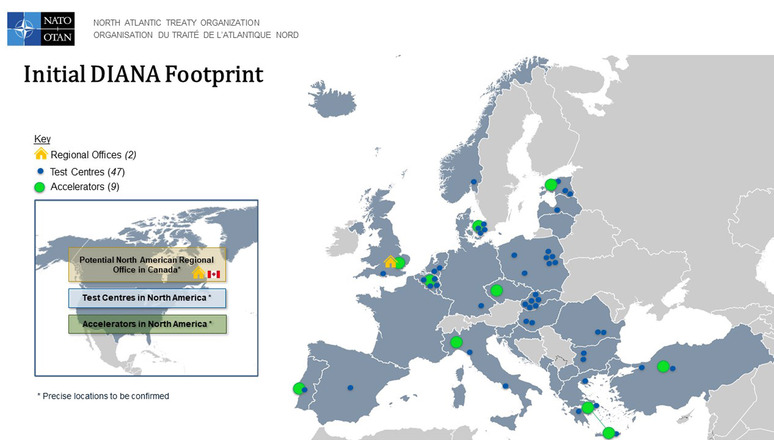Defense News
April 6, 2022
NATO unveils tech accelerator footprint, with plans for over 60 sites
STUTTGART, Germany – NATO is set to establish a new trans-Atlantic initiative meant to speed up the development of critical technologies, with one Euro-centric headquarters stationed in London and more than 60 partner sites around its alliance.
Last summer at the 31st annual NATO Summit in Brussels, Secretary General Jens Stoltenberg announced plans to establish the Defence Innovation Accelerator of the North Atlantic, or DIANA, based on the U.S. Defense Advanced Research Projects Agency.
…The ministers will approve DIANA’s charter during their April 6-7 meeting in Brussels, Stoltenberg said April 5 during a pre-ministerial press briefing.
The initiative comes with more than 60 innovation sites. That includes a headquarters in Europe and another in North America, about 10 “accelerator sites” that provide financing, mentorship and exposure to business opportunities to participating startups, and more than 50 dedicated test centers hosting labs and equipment.
***
The technology accelerator will be a new NATO body….
***
Among…selected sites are the Niels Bohr Institute at the University of Copenhagen in Denmark, which will focus on quantum technologies, and a new site in Turin, Italy, which will be dedicated to the space domain.
Imperial College London will host the European headquarters along with a DIANA accelerator, in a space currently housing the U.K.’s Defence and Security Accelerator….The U.K.’s program will be “twinned” with a new accelerator based in Tallinn, Estonia, to help share expertise, test cyber innovations and explore the viability of “virtual sites” to trial new tech such as autonomous vehicles.
***
The participating nations in DIANA’s innovation fund currently include Belgium, the Czech Republic, Denmark, Estonia, Germany, Greece, Hungary, Italy, Latvia, Lithuania, Luxembourg, Montenegro, the Netherlands, Norway, Poland, Portugal, Romania, Slovakia, Slovenia, Turkey and the United Kingdom.
***
A key aspect of DIANA will be to support NATO’s work in harnessing critical technology areas known as emerging and disruptive technologies, or EDT. The alliance recently identified propulsion and new materials as two new EDTs the deserve attention, joining artificial intelligence, autonomy, big-data processing, quantum-enabled technologies, biotechnology, hypersonic technology and space-related systems.
NATO has released public strategies for several of these EDTs – for space, AI and big-data processing….
====
NATO
April 7, 2022
NATO sharpens technological edge with innovation initiatives
NATO Allies are launching a ground-breaking initiative to sharpen the Alliance’s technological edge. On Thursday (7 April 2022), Allied foreign ministers approved the Charter of the Defence Innovation Accelerator for the North Atlantic – or DIANA. “Working with the private sector and academia, Allies will ensure that we can harness the best of new technology for transatlantic security,” said NATO Secretary General Jens Stoltenberg.
The Defence Innovation Accelerator for the North Atlantic (DIANA) will concentrate on deep technologies – those emerging and disruptive technologies that NATO has identified as priorities.
DIANA will bring defence personnel together….NATO leaders agreed that DIANA would have a regional office in Europe and in North America. DIANA’s European regional office was selected from a joint Estonian-United Kingdom bid, and Canada is actively looking at hosting the North American regional office.
